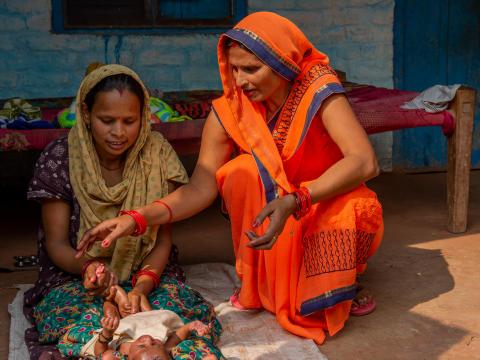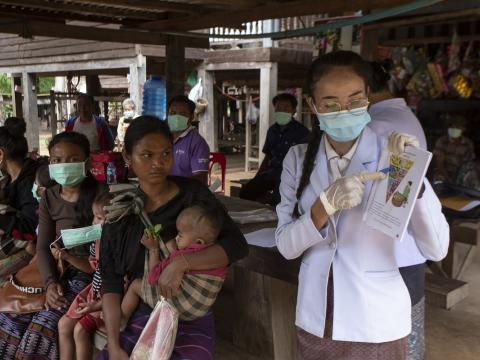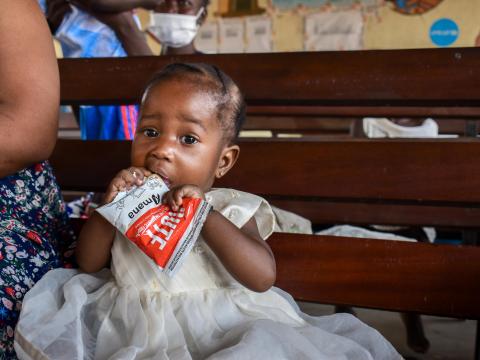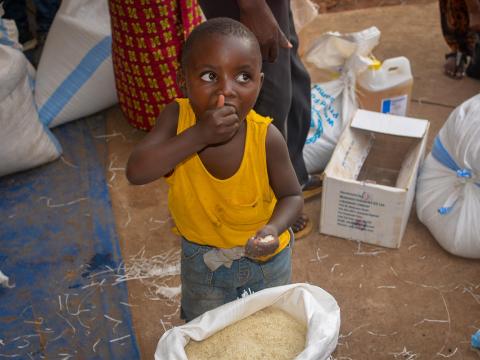
Overwhelmed frontline health workers a symptom of a sick system
On World Health Day Global Health & Nutrition Chief, Dan Irvine, says without more investment in strengthening health systems global-level resolutions will ring hollow.
7 April 2023
From where I sit there is a dizzying array of complex health and nutrition challenges that global experts need to consider and prioritise. World Tuberculosis Day has just passed (Tuberculosis remains the world’s biggest killer after COVID) and World Malaria Day, World Immunisation Day and World Nutrition Day are fast approaching. This year’s World Health Assembly in May is prioritising Universal Health Coverage (UHC) and Primary Health Care, along with pandemic preparedness and response. The U.N. General Assembly in September will host a high-level meeting on UHC, and we expect the global hunger crisis to be a hot topic there. In October the Partnership for Maternal, Newborn, Child and Adolescent Health and Nutrition will host an Adolescent-focused summit, and that same month we have the Micronutrient Forum.
All of these grand global events make me think of one thing: what is happening at frontline health facilities? While the global leaders debate and pass resolutions, is anything changing at the front line? Are health worker numbers increasing? Are supply chains improving? Is health system outreach to the most vulnerable children increasing?
In a very stark discussion with a colleague at the WHO nutrition department last year, they recommended that we not bother proposing new capacity- building initiatives for front-line health workers because they are already overwhelmed.
That is a very sobering reflection. It is what we call “zero sum”: one gain equals one loss, resulting in zero progress. It is very challenging to propose development in such a context.
Insufficient investment in health system strengthening makes resilience-building challenging indeed. We might say that this historic investment failure exposed our global vulnerabilities during the COVID pandemic, and currently in the hunger crisis. Subsequently we continue to focus on humanitarian-type responses rather than durable incremental improvements in public health systems. This has to change. We must meet minimum national health workforce requirements, and make the full spectrum of primary health care services, and commodities, affordably accessible to all.
Let’s take malnutrition as an example. The WHO has very competently laid out comprehensive Essential Nutrition Actions to be delivered through those front-line health facilities. I encourage you, wherever you are, to review this and to reflect on your own context: are these services being comprehensively delivered? In most cases the answer will be “no”. How then can we begin to talk about addressing malnutrition, and I daresay “prevent” malnutrition, when these fundamental services are not in place?
In the lead up to the last Nutrition for Growth Summit I managed the nutrition workforce recommendations on WHO’s behalf. The calculation there was that, in developing contexts, specific nutrition workforce capacity is roughly one-third of a minimum requirement. Therefore, when we talk about scaling up sustainable nutrition actions, the reality is that there are too few people on the ground to support them.
The world is not acting quickly enough to save millions of children, despite there being known and affordable solutions. Thus, as we respond to the global hunger crisis, we must look beyond our humanitarian response and advocate for the health system investments and improvements urgently needed to deliver and sustain essential nutrition actions. Food system improvements are desperately needed, but until health systems deliver their mandate of Essential Nutrition Actions*, we will continue to see preventable and unacceptable malnutrition in children.
The most recent Global Hunger Response (GHR) situation report highlights key concerns and ongoing impact as of February 2023 for GHR's 28 countries of highest alert. A number of converging factors are propelling people into heightened levels of hunger and malnutrition globally. Climate shocks and natural disasters in particular are contributing to accelerated food and nutrition insecurity, and, in some cases, exacerbating conflicts.
ENDS
For more information about World Vision's Health & Nutrition work click here
For more information about World Vision's Global Hunger Response click here
Notes
*The Essential Nutrition Actions are Women’s nutrition; breastfeeding; complementary feeding; prevention and control of anaemia; prevention and control of vitamin A deficiency; prevention and control of iodine deficiency. For more click here




